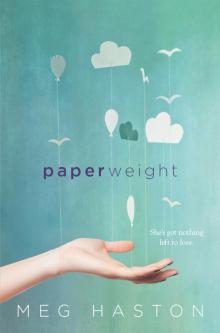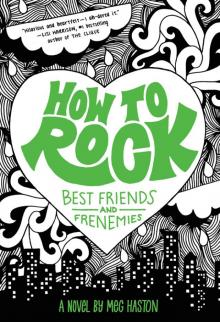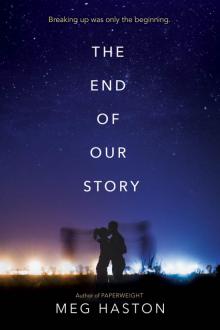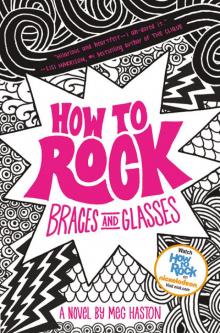- Home
- Meg Haston
Paperweight Page 5
Paperweight Read online
Page 5
At the back of the bar, a few community college students were drinking coffee at a long, farmhouse-style table. Students were easy to spot. The rips in their jeans were intentional. They didn’t wear the same kind of tired the townies did. My stomach seized. I didn’t belong here.
With my every step toward the table came a new awareness: the goose bumps puckering my skin, the way my thighs slapped together as I walked. The girth of my hips, my protruding stomach and back fat spilling over my cutoffs. All of me stitched together and straining at the seams.
There were mostly guys at the table, with only one girl close to my age and a woman with a ropy, gray French braid and a tiny diamond nose stud. The woman smiled at me. I took the chair across from her. I watched the girl out of the corner of my eye. She was thinner than me. Her thick, straight hair was so black it was almost iridescent blue. She had large green eyes winged with creamy layers of chartreuse and electric aqua that came to a point at her temples. A silver shooting star tattoo arced over her right cheekbone. The air around her smelled too sweet.
“You guys read Ashe’s latest book?” The popped collar two seats down cut his eyes in my direction. His sunglasses rested on the back of his neck. He wasn’t the typical two-year student. Too entitled. A local, probably, with money and a DUI from prom night that had inconveniently sidetracked his Ivy plan.
“I thought he played it a little safe, honestly,” the older woman spoke up.
“What do you mean?” I blurted. “I liked it.” My dad had spent our final family vacation editing the book.
“I like his early work better,” the woman said. “He was hungrier then.”
The boy ignored her. “What’s your name?” he asked me, balancing his chair on its back legs.
“Stevie.” My whisper was dusty. I searched the bar for Ben’s familiar outline. He was nowhere.
“Stevie. Nice.” The boy reached for his coffee mug and took a too-long sip. Licked the milky foam from his upper lip, slow. “Haven’t seen you in any of my classes so far.”
“Back it down, Drew.” The girl’s voice was low and thick. She rolled her eyes at me. “Hey. Eden.”
“Stevie,” I said again. My cheeks, my whole body, were burning. I reached into my backpack and found the journal Josh had bought me. I scratched at the shadowy sweat stains on the grass cloth cover.
“Just being friendly,” Drew murmured. “Buy you a drink, Stevie?”
“Now?” Electricity shot through me.
“Not now. Not on my watch.” Ben deposited a stack of composition books at the head of the table. He was about ten years younger than Dad, and Josh’s height but thicker, with a shaved head and diamonds in his ears. The sleeves on his white dress shirt were rolled up, almost glowing against the blackness of his skin. He smiled at me, all pity around the eyes and mouth, and my fists curled in my lap. A lump formed in my throat as I nodded back.
“Let’s get started.” Ben took a folded slip of paper from his shirt pocket and started taking roll. When he got to my name, he called it just like any other, and I relaxed a little.
“God, he’s delicious,” Eden said under her breath. She straightened up a little and tossed her hair back, and everyone looked except Ben.
I squirmed in my seat and pretended not to hear.
I spent the next three hours not hearing Ben, either, penning four different letters to my mother while the others freewrote on a childhood memory. I wondered if Ben was going to shake his head at my father over a beer.
“I don’t feel like going back to my apartment. My roommate’s kind of a slut,” Eden said after seminar was over and the rest of the class had dispersed. “Want to stick around?”
“Who, me?” I slammed the cover of my journal shut.
“Yeah, you.” Eden laughed a little. “Grab that table. I’ll be back.”
“Okay.” I didn’t feel like staying, but I didn’t feel like going home, either. I tucked myself in the corner booth. A few minutes later, she slid across from me and deposited two short glasses on the table.
“Oh. I don’t actually—” I touched the glass with awkward, virgin fingers. “I mean, thanks.”
It burned. That’s how people always describe the first drink, isn’t it? It burned going down. But that was exactly it: fire fingers reaching down my throat into my empty gut. I’d been fasting for six days and it felt like some huge transformation was happening inside me.
“Damn, girl.” Eden leaned back, impressed as I sputtered. “Take it slow!”
I expected the second sip to go down easier. It didn’t. “When did you get that tattoo?” I choked, pointing at the shooting star.
“Couple years ago. Ever thought about getting one?” Her lips curved upward.
“There’s nothing to get. Nothing I want on my body forever like that.”
“It’s just art. Overthink it and you ruin it.”
We stayed there in the back corner for hours. I shredded the napkins in front of me, leaving a snowy paper pyramid. She opened my journal without asking and scribbled her cell number on the inside cover in teal ink. Don’t look at what I wrote, I pleaded silently. She closed the journal and I took a breath.
“I just feel like Ashe is gonna be a really important part of my education,” Eden said earnestly. “Like he’s really gonna push me past my comfort zone, you know, as a writer.” She leaned in. The more she spoke, the closer her lips came to mine.
“And not just because he’s black or whatever,” she assured me. “It’s just, he’s so . . . different.” She pulled back, and her eyes focused in sudden, weird sobriety. “I can’t think of anything worse than being ordinary, can you?”
But I wasn’t ordinary. Already, I had started to change. My insides a little emptier, my cheeks a little more hollow.
“This is the terrible thing girls like us have in common,” she explained. “Parents, upbringings, lifestyles, that are painfully normal. Middle class.” It was almost amoral, being raised this way, she told me fiercely. We’d never really understand pain. And wasn’t that the human condition? By shielding us from the real world, pressing their palms over our eyes during all the bad parts, our parents—our parents—were keeping us separate from humanity. We were something else entirely.
“Animals,” I said absently, drawing my belly button toward my spine.
She shook her head. “That’s what I’m saying. We’re not even allowed to really be animals. Not allowed to experience, like, raw things. Because we were raised on fucking Fisher-Price and Splenda and Disney, you know?”
She looked like she might cry, so I said, “I know.”
“Haven’t you ever wanted to do something . . . This is gonna sound stupid. Don’t laugh.”
“I won’t.”
“Something . . . extraordinary? Something that sets you apart just to prove you’re, like, different?”
I tensed. Why couldn’t she see that something extraordinary had already begun? That once my metamorphosis was complete I would emerge as someone other than me? It wasn’t enough, clearly. I had to do more than fast. I would start to run tomorrow. Tonight maybe. Tonight.
“Seriously, though.” She lifted her glass to her lips and threw her head back even though the glass was empty. “We should do something. Something real.” Her eyes were shining, the wet metallic green of insect wings in summer.
Sitting there in the bar, I realized that I had no idea how many calories were in a glass of scotch. Or even two or three. By then, I was too drunk to panic.
“Like what?”
“Come on.” She grabbed my wrist and pulled me out of the booth to the door.
I put the pen down and tip my face toward the hot New Mexico sun, unable to write the rest. The sounds of that night running together like water. There was the slap of our feet on the pavement and the buzz of the neon sign in the window. Eden’s giggles as she passed me her ID before we went inside (Shh, Eden said, shh). There was the sound of my voice, my words as I described her. There was the hum of t
he needle.
I’d felt so proud when we’d left. Felt like it was symbolic, the way there was a bandage wrapped around the image of my mother. She was the wound. It was fucking poetry. And then something changed. Eden left to go back to her apartment and I sat alone in my car and I was empty. I was hungry—my god, I hadn’t eaten in six days, what did I expect? Somehow, I was lonely for this girl I didn’t know, this girl who cared enough to ask me not to laugh, this girl whose black-hole pupils lined up with mine when she spoke. And I ached to be full of something, anything at all. Hurry, hurry, hurry, fill it up.
The rest is a blur. It has to be. The drunken ride to the grocery store, wandering the aisles with my throbbing arm, the laughing at nothing and the passing cars. Sitting in Dad’s old Buick, parked in the abandoned lot a few blocks from the house. The sound of static radio making my insides quiver. And I knew, in a place deeper than seeing or feeling, that this was a beginning. I was about to do something that could not be undone. Something dangerous. Something toxic.
Something extraordinary.
day six
Wednesday, July 9, 7:59 A.M.
AFTER breakfast, I’m supposed to meet Shrink on the lawn for a session. But when I shove past Hannah and through the double doors, Shrink’s not outside. I survey the grounds for a place to purge. I could care less if anyone catches me. Even though I ate only half of my individual carton of yogurt—I like the way the sweet white yogurt feels cool on the back of my throat—I can still feel it consuming me. At the edge of the lawn, there’s a cluster of low shrubs. Perfect.
“Hi, Stevie.”
I turn. Shrink is standing directly in front of the sun, so all I can see is the blackness of her outline. She looks like a stained-glass Jesus, standing over me with the sunlight behind her. My Savior, in a white sundress and the usual flat brown sandals.
“You ready for the treatment team meeting?” Shrink is holding my file in one hand. Her creamy cheeks are dusted with peach.
“Oh, right.” I slide my fingers through my short, limp hair. My skull is irregular, with divots and ridges.
We cut through the villa and exit the front door. I take the stairs to the right of the fountain. On the steps, recovery slogans are chalked in neon pink and yellow. You Are a Soul with a Body, Not a Body with a Soul! Bite Me, Ed! It’s bizarre how they turn the words eating disorder into a man’s name: Ed. Poor bastard.
“Each of the members of your treatment team will talk for a bit about their assessment of your needs,” she says.
“But they don’t know me.” Not that Shrink does, either. I follow a few feet behind, kicking blood-colored dirt over her tracks. Already the heat is ruthless; the sun feels just inches away. I am slightly dizzy again, which is comforting. My body is obeying the command. I wonder what she’ll do if I stop and puke right here.
“True. They don’t know you yet.” She stops and turns, waiting for me to catch up. “But after taking a look at your testing and blood work, they do know what you need in order to live.”
We walk up a small hill toward yet another stucco building with a flat roof. There are a few low shrubs planted in gravel around the perimeter. This is one thing I can appreciate about the desert: It is without pretense. There are few perfumed flowers, or lush green leaves, or other signs of life or beauty. The environment is harsh; the life that has survived is stripped of excess.
“Did you get around to journaling?” Shrink yanks open a small wooden door. I follow her inside.
“Yeah.”
“Awesome. That’s great.” She closes the door behind us and the foyer is plunged into near darkness. It takes my pupils a few seconds to adjust.
“It’s not any good, though.”
“It’s your thoughts and feelings. We don’t put a label on those. They are what they are.” She flips a switch near the door, and a dim yellow light buzzes overhead.
“Did they teach you that in shrink school?”
She laughs. “As a matter of fact, they did. Still true, though.”
The building is composed of only a few carpeted rooms, plus an eat-in kitchen and small bathroom. It could have been someone’s home once. In the back room, plastic blinds shield a sliding glass door. They remind me of the blinds we had at Le Crâpeau. The room is empty except for a circle of brown metal folding chairs in the center.
“Hi, my name is Stevie, and I’ll be dead in twenty-two days.”
“Hiii, Stevie.”
“Have a seat wherever you’d like.” Shrink drops her bag in one of the chairs and kicks off her shoes. It’s like her need to be barefoot is biological. She meanders over to the blinds and twists the hanging plastic rod, flooding the room with light. “We’ll just hang out and wait for the rest of the team.”
I take the seat to the left of her bag and stare at the gashes of outside world between the blinds. In the foyer, the door creaks. Seconds later, two men and a woman enter. The men are wearing white coats. One of the men is the Indian psychiatrist I saw with CB the other day. He has a goatee, wire-rimmed glasses, and bushy eyebrows. He greets me with a deep nod that is almost a bow.
“Miss Deslisle. A pleasure.” His accent is thick. “I am Dr. Singh.” He takes a seat in one of the chairs in the circle. Shrink and the other two strangers sit, too. We are so close our knees almost touch.
“I’m Dr. Wilkes,” says the other man. He is young with slick dark hair and a chin dimple. “I’ll be your physician.”
“And I’ll be your dietician,” the woman says. Her long white waves are parted down the center and her smile reveals a gap between her two front teeth. A pair of lime-green reading glasses crowns her nose. “I’m Ms. Dalton.”
“Hey.” My voice sounds raspy. I clear my throat and cross my arms over my chest. Suddenly, I want to shove my chair back, away from the circle. We are too close, these strangers and me, and I am taking up too much space.
“Okay,” Shrink says brightly. “So, Stevie, the four of us make up your treatment team. We are all available to you while you’re here—to answer questions, talk, vent, whatever. Okay?”
The dietician chimes in. “This is your treatment, Stevie. We want you to be an active participant in your own healing.”
My treatment. She is telling me that if this doesn’t stick, it will be my fault and mine alone. “You know I’m being forced to stay here, right?”
Dr. Wilkes coughs.
“Just being honest,” I say blithely. “You know, about my thoughts and feelings.”
Shrink jumps in. “And we want you to be. The hope is that once you’ve gone through the refeeding process, and as we make progress in therapy, you’ll be more motivated to seek recovery.”
Refeeding? Even the word sounds inhumane.
“Who wants to start? Sherri?” Shrink nods at Ms. Dalton, who sits to my left.
“Sure.” Ms. Dalton reaches into her bag and pulls out a slim black binder. She smells sweet, like the jasmine behind my old house. “From what I can tell on your chart, it’s been difficult for you to complete meals or accept supplement since you got here”—she consults her bible—“five days ago.”
“This is the sixth day.”
“Six days ago. Would you say that’s an accurate assessment?”
“No. Not difficult. I choose not to eat.”
“Okay.” She consults the binder in silence for a while. “It looks like you’re restricting all food with the exception of yogurt and lettuce?”
Thank you. “Yes.”
“So one of my goals for you, obviously, is to get you to the point where you can complete the majority of your meals. The refeeding process—”
“Refeeding means starting you on foods that are easier on your system, to get your body used to food again.” I hate that Shrink has read my mind. “It’s why we’ve started you on soup, crackers, applesauce, those sorts of things.”
I close my eyes. Soup means a shiny coating of oil over chunks of meat drowned in yellowed noodles. I will not.
Ms. Dal
ton starts up again. “Given your weight upon your arrival—”
My eyes snap open, and my heart thrums like hummingbird wings. “Tell me.”
Her lips wither. “Tell you your weight?”
I nod. That binder holds everything I need. The numbers.
“What would that do for you, Stevie?” Shrink crosses her legs and leans toward me. “To know your weight?”
Everything. I slip my hand around my wrist and squeeze.
“Stevie—” Ms. Dalton falters. “My assessment is that knowing your weight could be more harmful than helpful.”
“So you’re not going to tell me.” She thinks I am fragile. She thinks I will shatter.
“For now, let’s focus on getting you through refeeding. After that, it’s my recommendation that we put you on a weight-gain meal plan, instead of maintenance.”
Good. Maintenance is for the bulimics and the girls who have made half-assed attempts at anorexia. I won’t actually gain the weight, of course. But I can appreciate the recognition.
Dr. Singh makes a note on the legal pad in his lap.
“How much?” I ask her. I am cool. Unaffected. “How many pounds?”
I can feel her eyes on me. “We’re recommending that you gain somewhere around twenty-five pounds,” she says.
The number burns like ice in my veins. It’s wrong. The number should be higher. Twenty-five? My god, I’m such a failure.
“Stevie?” Shrink’s voice is somewhere at the back of my brain.
Twenty-five. I press my fingertips to my collarbone, frantic. It isn’t there, it isn’t there. I feel only flesh. Twenty-five. I am spinning.
“Stevie.” I feel Shrink’s hand pressing down on my right shoulder. “What’s happening for you right now? Can you verbalize your thoughts?”

 Paperweight
Paperweight How to Rock Best Friends and Frenemies
How to Rock Best Friends and Frenemies The End of Our Story
The End of Our Story How to Rock Braces and Glasses
How to Rock Braces and Glasses